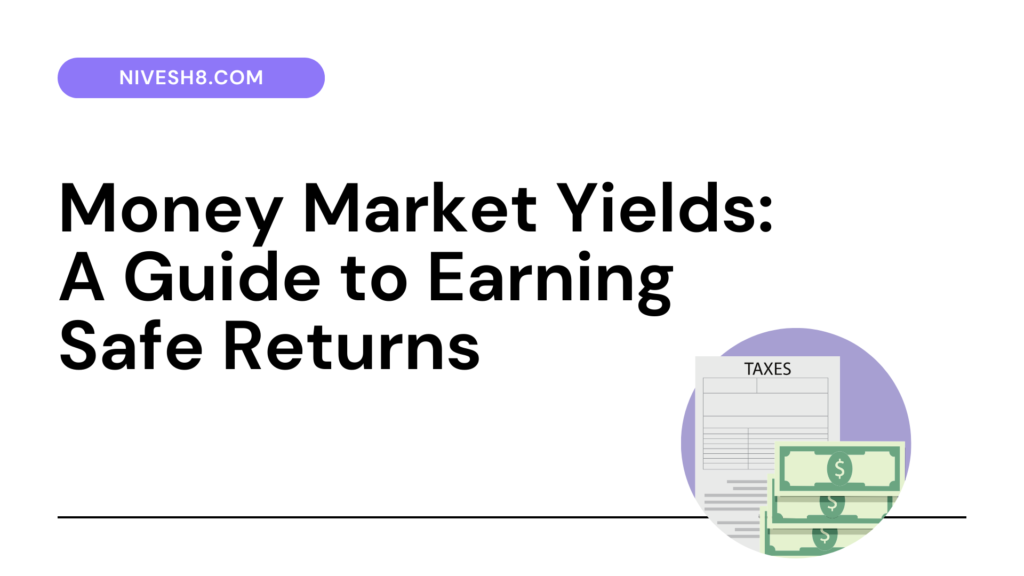Money market yields are the returns or interest paid on money market investments. Treasury bills, commercial papers, certificates of deposit, and repurchase agreements form short-term, low-risk debt securities used in money market instruments. Investing in money market instruments mostly serves to preserve capital and yield meager returns. This guide will go over what money market yields are, how they are computed, and why a conservative investment strategy depends on them.
Definition of Money Market Yields
Money market yields are the income produced from short-term debt instrument investments. Usually stated as an annual percentage, these yields represent the return an investor gains from keeping the instrument to maturity. Because they carry little risk and have short maturities—often less than a year—money market yields are typically lower than those of long-term bonds or equities. Their liquidity and security make them preferred even if their returns are less.
Why Purchase Money Market Instruments?
Those looking to temporarily store their money and get some interest would be wise in investing in money market instruments. Money market yields are appealing for the following reasons:
- Safety of Principal: Low risk given issuers’ excellent credit quality.
- Liquidity: Simple enough to turn into cash without appreciable loss of value.
- Maturity: Usually maturing inside a year, investments help to lower interest rate risk.
- Consistency: Though little, the returns are rather consistent.
- Portfolio Diversification: Balances high-risk assets with safer choices.
Treasury Bills (T-Bills)
- Issued by the government with one-year maturities, among others.
- Usually low, yields almost completely free of risk.
Commercial Papers (CPs)
Yield=(Face Value−Purchase Price)Purchase Price×365Days to Maturity\text{Yield} = \frac{( \text{Face Value} – \text{Purchase Price})}{ \text{Purchase Price}} \times \frac{365}{\text{Days to Maturity}}Yield=Purchase Price(Face Value−Purchase Price)×Days to Maturity365
- Issued by companies to cover temporary financial demands.
- While you have somewhat more risk, they offer better yields than T-bills.
- Usually, maturities run between seven days and 270 days.
Deposit Certificates (CDs)
- Issued by banks with stated maturities and fixed interest rates.
- Compared to T-bills, they offer reasonable returns.
- Maturities range from a few weeks to many months.
Repurchase Agreements (Reorders)
- Agreements for short-term borrowing whereby securities are sold with a promise to be repurchased at a higher price.
- Yield results from the purchase and repurchase price’s difference.
Mutual Funds in Money Markets
- Combined money market instrument investments using pooled funds.
- Thanks to diversified investments, they offer somewhat better yields.
How are Money Market Yields Computed?
Calculating money market yields most commonly uses:
- Discount Yield:
Discount Yield=(Face Value−Purchase Price)Face Value×360Days to Maturity×100\text{Discount Yield} = \frac{(\text{Face Value} – \text{Purchase Price})}{\text{Face Value}} \times \frac{360}{\text{Days to Maturity}} \times 100Discount Yield=Face Value(Face Value−Purchase Price)×Days to Maturity360×100 - BEY (Bond Equivalent Yield):
BEY=Face Value−Purchase PricePurchase Price×365Days to Maturity\text{BEY} = \frac{\text{Face Value} – \text{Purchase Price}}{\text{Purchase Price}} \times \frac{365}{\text{Days to Maturity}}BEY=Purchase PriceFace Value−Purchase Price×Days to Maturity365 - EAY (Effective Annual Yield):
EAY=(1+Discount Yield365/Days to Maturity)365/Days to Maturity−1\text{EAY} = \left( 1 + \frac{\text{Discount Yield}}{365/\text{Days to Maturity}} \right)^{365/\text{Days to Maturity}} – 1EAY=(1+365/Days to MaturityDiscount Yield)365/Days to Maturity−1
Variables Influencing Money Market Yields
- Environment of Interest Rates: As rates rise, yields usually rise as well.
- Credit Risk: Higher yields in corporate instruments help to offset greater credit risk.
- Demand for Liquid Assets: Increased demand could cause yields to climb.
- Economic Situation: High demand in uncertain times could lower the yields on safer instruments.
Advantages of Money Market Yields
- For conservative investors, safety of principal makes money market investments perfect.
- Regular interest payments provide consistent cash flow.
- Parking funds temporarily while earning returns would be best for an emergency fund.
- Unlike long-term bonds or stocks, money market instruments exhibit little price swings.
Disadvantages of Money Market Yields
- Interest Rate Risk: Should interest rates drop, your returns would be lessened and the money market yield may drop as well.
- Default Risk: Instruments like commercial papers could have more default risk.
- Inflation: Should inflation exceed yield, the actual value of returns could drop.
- Reinvestment Risk: Should rates decline, reinvested matured money at lower yields could lower income.
Money Market Instrument Investing Techniques
- Make direct purchases of T-bills or CDs via financial institutions.
- Invest in a fund including a diversified mix of money market instruments.
- Certain ETFs and debt funds concentrate on money market securities, offering daily liquidity.
- Certain banks provide attractive yielding money market deposit accounts.
Who Should Make Money Market Yield Investments?
- Risk-Averse Investors: Investors that give capital protection top priority over strong returns.
- Short-Term Investors: Perfect for people wishing to invest for a few months to a year.
- Retirees: Those looking for consistent income without running great risk on their savings.
- Institutional Investors: Corporations looking to temporarily park extra funds.
Comparative Analysis with Other Investments
| Type of Investment | Potential Risk Level | Liquidity | Maturity |
| Yields in the Money Markets | Low to Moderate | High | Short |
| Government Bonds | High | Short | |
| Corporate Bonds | Moderate | Low | Long |
| Stock Dividends | Very High | High | Variables |
Last Words
Conservative investors and those trying to preserve liquidity while getting meager returns would find great value in money market yields. They are quite stable and safe even though they have low potential for growth. Evaluate your investing goals and risk tolerance before making a purchase. Selecting the appropriate money market instrument will enable you to strike a balance between income and safety, offering a dependable means of capital preservation with returns.



